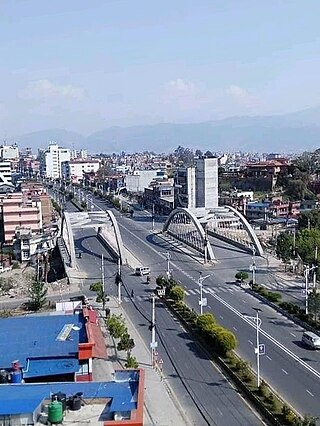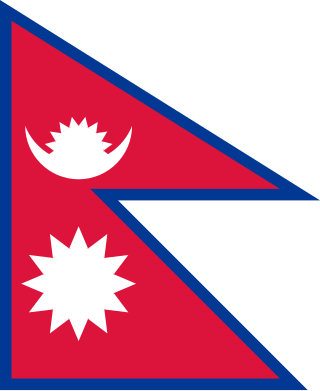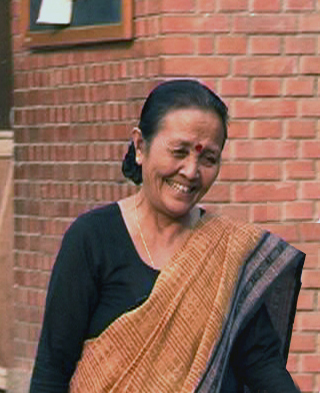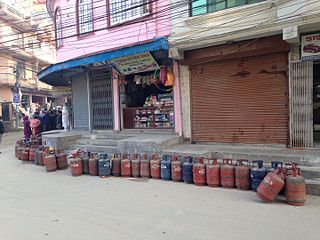
The economy of Nepal is developing category and largely dependent on agriculture and remittances. An isolated, industrial society until the mid-20th century, Nepal entered the modern era in 1951 without schools, hospitals, roads, telecommunications, electric power, industry, or civil service. The country has, however, made progress toward sustainable economic growth since the 1950s. The country was opened to economic liberalization, leading to economic growth and improvement in living standards when compared to the past. The biggest challenges faced by the country in achieving higher economic development are the frequent changes in political leadership, as well as corruption.

Though the Ministry of Foreign Affairs (MOFA) is the government agency responsible for the conduct of foreign relations of Nepal, historically, it is the Office of Prime Minister (PMO) that has exercised the authority to formulate and conduct policies related to Nepal's foreign affairs. As a landlocked country wedged between two larger and far stronger powers, Nepal has tried to maintain good relations with both of its neighbors, People's Republic of China and Republic of India. Nepal's relationship with China, India, and the United States has remained utmost priority for successive Nepali governments. The relationship between Nepal and India however was significantly hampered during the 2015 Nepal blockade by pro-Indian anti-Nepal protestors, where the Government of Nepal accused India of using "Russia-Ukraine" tactics to cause unrest along Nepal's southern border using ethnically Indian residents of Nepal. India strictly denied the allegation and said the unrest were solely due to Madheshi protesters. For the most part though, Nepal has traditionally maintained a non-aligned policy and enjoys friendly relations with its neighboring countries and almost all the major countries of the world.

Mahendra Bir Bikram Shah Dev was the King of Nepal from 13 March 1955 until his death in 1972, which was due to heart attack as told in an interview by his personal physician Dr. Mrigendra Raj Pandey. Following the 1960 coup d'état, he established the partyless Panchayat system which governed the country for 28 years until the introduction of multiparty democracy in 1990. During his reign, Nepal experienced a period of industrial, political and economic change that opened it to the rest of the world for the first time after the 104-year-long reign of the Rana rulers, who had kept the country under an isolationist policy, came to an end in 1951.

Japan Tobacco Inc., abbreviated JT, is a cigarette manufacturing company. It is part of the Nikkei 225 and TOPIX Large70 indices. In 2009 the company was listed at number 312 on the Fortune 500 list. The company is headquartered in Toranomon, Minato, Tokyo and Japan Tobacco International's headquarters are in Geneva, Switzerland. As of 2012 the chairman is Hiroshi Kimura and the CEO is Mitsuomi Koizumi. It was founded as an enterprise of the Japanese government in 1945, and became a public company on 1 April 1985.
Nepal Airlines Corporation, formerly known as Royal Nepal Airlines, is the flag carrier of Nepal. Founded in 1958, it is the oldest airline of the country. Out of its main base at Tribhuvan International Airport, Kathmandu, the airline operates domestic services within Nepal and medium-haul services in Asia. The airline's first aircraft was a Douglas DC-3, used to serve domestic routes and a handful of destinations in India. The airline acquired its first jet aircraft, Boeing 727s, in 1972. As of February 2023, the airline operates a fleet of six aircraft. Since 2013, the airline has been on the list of air carriers banned in the European Union.

The Treaty of Sugauli, the treaty that established the boundary line of Nepal, was signed on 4 March 1816 between the East India Company and Guru Gajraj Mishra following the Anglo-Nepalese War of 1814–16.

Iodised salt is table salt mixed with a minute amount of various salts of the element iodine. The ingestion of iodine prevents iodine deficiency. Worldwide, iodine deficiency affects about two billion people and is the leading preventable cause of intellectual and developmental disabilities. Deficiency also causes thyroid gland problems, including endemic goitre. In many countries, iodine deficiency is a major public health problem that can be cheaply addressed by purposely adding small amounts of iodine to the sodium chloride salt.

Himalaya: Caravan is a 1999 Nepali film directed by Éric Valli and was funded through based in France corporations. It was the first Nepalese film to be nominated in the Best Foreign Film category at the 72nd Academy Awards.

Apa, nicknamed "Super Sherpa", is a Nepalese Sherpa mountaineer who, until 2017, jointly with Phurba Tashi held the record for reaching the summit of Mount Everest more times than any other person. As part of The Eco Everest Expedition 2011, Apa made his 21st Mount Everest summit in May 2011 then retired after a promise to his wife to stop climbing after 21 ascents. He first summited Everest in 1990 and his last time to the summit was in 2011.

Panauti is a municipality in Kavrepalanchok District in Bagmati Province of Nepal located 32 km Southeast of the capital Kathmandu. The town is currently listed as a UNESCO tentative site since 1996.

Nepali cuisine comprises a variety of cuisines based upon ethnicity, alluvial soil and climate relating to Nepal's cultural diversity and geography. Dal-bhat-tarkari is eaten throughout Nepal. Dal is a soup made of lentils and spices, bhat — usually rice but sometimes another grain — and a vegetable curry, tarkari. Condiments are usually small amounts of spicy pickle which can be fresh or fermented, mainly of dried mustard greens and radish and of which there are many varieties. Other accompaniments may be sliced lemon (nibuwa) or lime (kagati) with fresh green chilli and a fried papad and also Islamic food items like rice pudding, sewai, biryani etc. Dhindo (ढिंडो) is a traditional food of Nepal. A typical example of Nepali cuisine is the Chaurasi Byanjan set where bhat (rice) is served in a giant leaf platter (patravali) along with 84 different Nepali dishes each served on small plates. It is mostly fed during weddings and Pasni(rice feeding ceremony).

Nepal sent a delegation to compete at the 2002 Winter Olympics in Salt Lake City, United States from 8–24 February 2002. This was Nepal's first time participating in a Winter Olympic Games. The delegation consisted of a single cross-country skier, Jay Khadka. In the men's sprint he finished in 70th place, and in the men's 2 × 10 kilometre pursuit he finished in 79th place, and did not advance to the finals of either event.

India–Nepal relations are the bilateral relations between the Republic of India and the Federal Democratic Republic of Nepal. Both countries initiated their relationship with the 1950 Indo-Nepal Treaty of Peace and Friendship and accompanying secret letters that defined security relations between the two countries, and an agreement governing both bilateral trade and trade transiting Indian territory.

Dana, Nepal is a village development committee in Myagdi District in the Dhaulagiri Zone of western-central Nepal. At the time of the 1991 Nepal census it had a population of 1787 people living in 398 individual households.

Anuradha Koirala, Okaldhunga district, is a Nepalese social activist and the founder of Maiti Nepal – a non-profit organization in Nepal, dedicated to helping victims of sex trafficking. She was appointed as 1st Governor of Bagmati Province from by the Government of Nepal.

The Nepalese Ministry of Minister of Industry, Commerce and Supplies is a governmental body of Nepal to monitor and manage industries of the country.

The China–Nepal border is the international boundary between the Tibet Autonomous Region of the People's Republic of China and Federal Democratic Republic of Nepal. It is 1,389 kilometres (863 mi) in length and runs in a northwest–southeast direction along the Himalayan mountain range, including Mount Everest, the world's highest mountain. The boundaries of this particular border have changed dramatically over time, especially when considering relatively recent events such as the Annexation of Tibet in 1949. However, some of the most significant developments of modern times would be the signing of the "Agreement on Maintaining Friendly Relations between the People’s Republic of China and the Kingdom of Nepal" in 1956 and the "Sino-Nepalese Treaty of Peace and Friendship" in 1960, both of which formally recognised Tibet as a part of China and confirmed the limits of the countries of China and Nepal as they are known today.

The 2015 Nepal blockade, which began on 23 September 2015 and lasted about six months, was an economic and humanitarian crisis which severely affected Nepal and its economy.
The Delhi-Kathmandu bus is a trans-boundary bus service connecting India and Nepal's capitals at Delhi and Kathmandu respectively. The service is operated by the Delhi Transport Corporation (DTC) and was launched in 2014.

The Tibet–Nepal salt trade route is an ancient salt trading route running between the Tibetan Plateau and the Middle Hills of Nepal, and further on to India. After the annexation of Tibet by China in 1950 and the Sino-Indian War in 1962, patterns of trade changed, and the use of the old trading route between India and Tibet dwindled and the salt-carrying caravans became redundant.

















